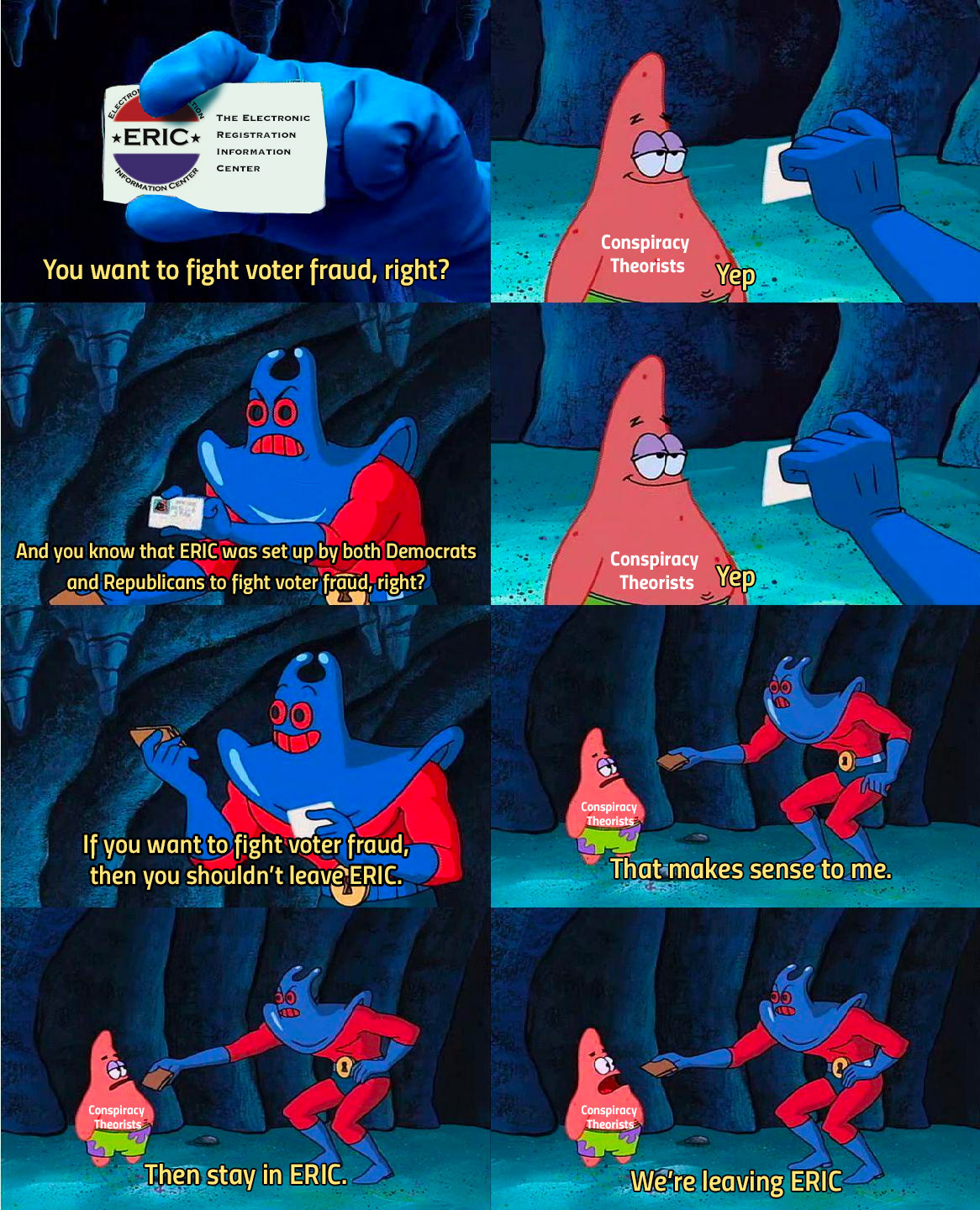
 |
By Bo Harmon RepresentUs Campaign Advisor |
March 10, 2023
Every American – regardless of their politics – wants secure elections that are free from fraud. To encourage trust in the results of elections and our democracy, we need those things. Unfortunately, there’s a growing trend of politicians using the phrase “election integrity” to justify actions that actually undermine trust in elections.
This week, three states officially pulled out of a little-known but essential voter registration organization called ERIC. Which might not seem like a big deal, but it demonstrates how self-interested politicians are using a vague and distorted defense of “election integrity” to serve their own goals. Hypocritically, their decision could cause elections to have less integrity and more fraud.
Let’s dive into what happened, and what it means for our elections.
The Electronic Registration Information Center, explained
Let’s get the wonky acronym definitions out of the way. The Electronic Registration Information Center (ERIC) is an under-the-radar, competent organization with a proven track record of combating voter fraud. Seven states – led by Democrats and Republicans – created it in 2012 so that states could share voter registration data. This is important because it helps ensure accurate voter rolls. Despite its relative obscurity, 33 states and Washington, D.C. have all joined just a decade later.
In our federalist system, each state runs its own elections. That means each state also has its own voter registration list and its own rules for tracking and managing it. Since there’s no national voter registration system, ERIC’s purpose is to fill that gap in our election infrastructure.
ERIC allows member states to share government data (i.e. Department of Motor Vehicle data, federal death data, and change of address data) they might otherwise be unable or unwilling to get. States use that shared data to remove voters from their lists who have moved or died. They also use it to register eligible voters when they move to a new place. This kind of partnership was sorely needed because as many as 1 in 8 voter registrations are invalid or inaccurate. Additionally, according to recent US census data, tens of millions of eligible voters are not registered to vote.
ERIC also helps find the few people who commit voter fraud each year when they attempt to vote in multiple places. Say, for example, you move from Virginia to Arizona and register to vote in Arizona. You, like most people, are probably not going to think to call the Virginia Elections Office and tell them to cancel your registration there. ERIC, in this case, would tell Virginia that you’ve registered in Arizona and that they can remove you from Virginia’s voter rolls. Without ERIC, you could theoretically request a ballot and vote in both places.
So… why are states attacking and leaving ERIC?
ERIC sounds pretty noncontroversial, right? Unfortunately, it’s becoming a target of myths and lies from self-interested politicians. Fringe activists and outlets started spreading conspiracies last year about what ERIC does and where its funding comes from. This nefarious group includes those seeking a repeat of January 6, and their goal is to rile people up and undermine trust. While their outrageous claims about ERIC are totally false, some politicians are taking the bait.
Last year, Louisiana left ERIC. Earlier this year, Alabama announced it would do the same. And just this past week, three more states – Florida, Missouri, and West Virginia – followed suit, with even more states poised to be next.
If these officials want to fight fraud, they would champion the ERIC partnership. They are acting on lies about voter fraud by taking actions that… make voter fraud more likely to occur. This absurd hypocrisy is best demonstrated by Ohio’s secretary of state, who just weeks ago called ERIC “one of the best fraud-fighting tools that we have.” Naturally, he is now threatening to withdraw Ohio from the organization.
Without ERIC’s tools and information sharing, these states will lose a crucial safeguard to fight election fraud and ensure election integrity. ERIC’s executive director recently released an open letter that disproves the conspiracies and points to the organization’s rigorous data security standards and commitment to transparency. But for these politicians who easily disregard what is best for their constituents in favor of power, facts will never win out.

States should be joining ERIC, not leaving it
If there is a valid criticism of ERIC, it’s that not every state is in it! Even before the recent wave of departures, 17 states were not participants. These include large population centers like California, New York, North Carolina and Tennessee. Without a national voter registration system, ERIC does more to secure our elections than anything else. If we let the conspiracy theorists and anti-democracy forces win, more states could leave the organization, leaving ERIC less effective. And less able to fight fraud.
It is difficult for a bipartisan interstate organization like ERIC to exist in today’s polarized political landscape. Those who attack it are blatant hypocrites looking to score a messaging win at the expense of genuine election integrity. Voter fraud is still incredibly rare, but it does happen and ERIC is our best tool to fight it. Elected officials should focus on real problems, like the growing threats to election workers, not baseless claims from insidious sources.
We must continue to call out misinformation and hypocrisy while we fight for fair voter registration systems. Join us in this anti-corruption movement by signing up below!
Contributors: Nolan Bush, RepresentUs Writer and Alexi Santiago, RepresentUs Research Assistant